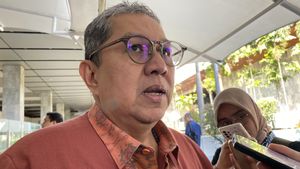JAKARTA - PT Hero Supermarket Tbk (HERO) will close all Giant stores in July. The impact of closing the Giant outlet will make micro, small and medium enterprises (MSMEs) out of business and mass layoffs will occur. Because, there are hundreds or even thousands of MSME workers who become the supply chain to Giant outlets throughout Indonesia.
President of the Confederation of Indonesian Workers' Unions (KSPI) Said Iqbal said the fall of the giant 'Giant' resulted in thousands of workers losing their jobs due to MSMEs which became suppliers of perishable goods along with the fall of the giant.
Therefore, Iqbal asked the government, in this case the Minister of Manpower, the Minister of Cooperatives and MSMEs, and the Minister of Industry to think about the fate of the MSMEs partnering with Giant as suppliers of goods sold in the Hero Group supermarket group.
"What must also be considered is ensuring that the rights of the thousands of Giant workers are paid in accordance with the contents of the PKB using the old severance pay rules contained in the Manpower Act. Not using the new rules regulated in the omnibus law of the Job Creation Law. Because the value of the PKB is higher than the value of the Job Creation Law," said Iqbal, in Jakarta, Tuesday, June 1.
According to Iqbal, there are two major parts that must be completed by the three ministries mentioned above. The first part is how to channel the nearly 3,000 laid-off Giant employees to other Hero Group business units as much as possible, such as Hero Supermaket, Guardian, and IKEA.
"The government must think about the social impact that has occurred due to the thousands of Giant workers who have been laid off in the midst of facing economic difficulties in the COVID-19 pandemic,"
Saiq Iqbal
"In this case, the Minister of Manpower must take the initiative as a leader, forcibly summon the management of Giant and Hero Group to ensure the deadline for the completion of the layoff case," he said.
Not only that, said Iqbal, the Minister of Manpower Ida Fauziyah must also ensure the distribution of workers to other Hero Group business units, and pay for labor rights that must be provided by the management of Giant and Hero Group.
The second part, said Iqbal, the government is obliged to help hundreds or even thousands of MSME business actors as a supply chain to Giant who lost their business. In addition to the thousands of workers in the MSME industry who have also been laid off, they must also get their rights, such as severance pay, compensation and final wages.
"The question is, where does the MSME industry pay for their workers' rights? Because we can be sure that Giant and Hero Group will not pay compensation or severance pay for MSME workers who have been laid off due to Giant's closure. The government must be responsible for finding solutions for thousands of MSME workers who are also involved. layoffs," he said.
KSPI urges government to take responsibilityKSPI will continue to fight to urge the government to take responsibility for the rights of Giant workers who were laid off and the rights of MSME workers who lost their jobs because the supply chain was cut by Giant.
According to Iqbal, the layoffs of thousands of people in the midst of the COVID-19 pandemic proves that the Omnibus Law on Job Creation cannot be a solution to ensure workers do not lose their jobs.
Furthermore, Iqbal said that the Giant closure case which resulted in the layoff of tens of thousands of Giant and MSME workers explained the fact that the Omnibus Law on the Job Creation Law was not a solution to increasing investment in Indonesia. Even earlier, PT Freetrend in Tangerang Regency closed and laid off 7,800 workers. Likewise, PT Lawe Adya Prima in Bandung City, which laid off 1,200 workers.
"The company closures that occurred in Giant, PT Freetrend, and PT Lawe Adya Prima which caused tens of thousands of workers to lose their jobs, prove that the government is powerless to provide certainty to the business world and workers who are working," he said.
"Never mind new investments entering Indonesia, existing investments just left Indonesia and caused tens of thousands of workers in the three companies to be laid off. The Omnibus Law of the Job Creation Law, especially the employment cluster, is not the answer needed by workers and investors to be able to do business in Indonesia. Indonesia. Even though the government was touting that when the omnibus law was ratified, there were no layoffs and brought in investments that would create jobs," he continued.
Reflecting on the cases of Giant, PT Freetrend, and PT Lawe Adya Prima, KSPI urges the judges of the Constitutional Court (MK) to cancel or revoke the Job Creation Law, especially the labor cluster, which makes the position of workers increasingly difficult and structurally impoverished.
The English, Chinese, Japanese, Arabic, and French versions are automatically generated by the AI. So there may still be inaccuracies in translating, please always see Indonesian as our main language. (system supported by DigitalSiber.id)













